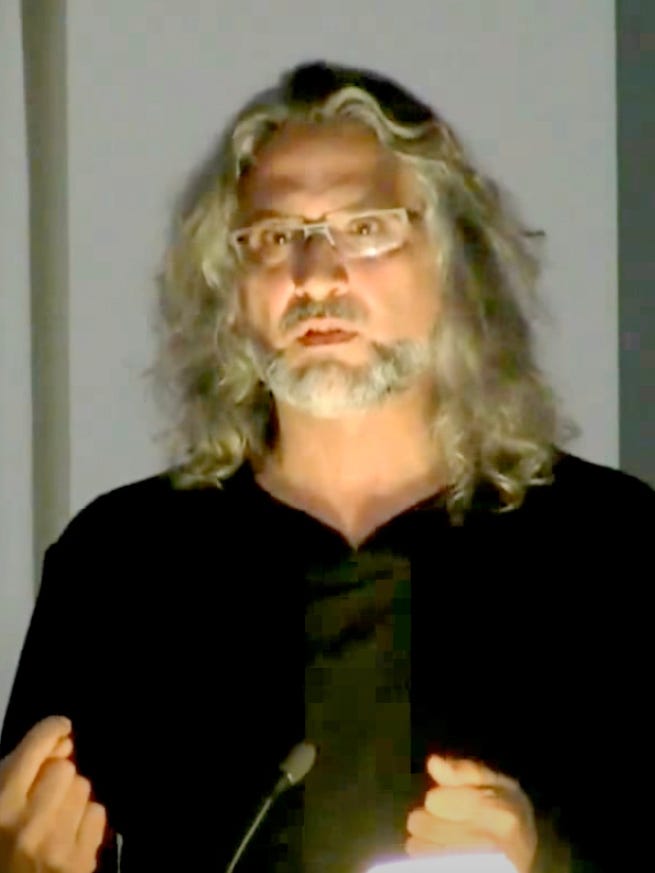 |
| See the video in which Jaques ‘Jaques’ Liverot speaks about politics - here. |
“[] A certain sort of analytic philosopher who dismisses as meaningless what does not instantly make sense to his shallow pate…. I coined a name for people like him: ‘philosophistine.’ A philistine out of his depth among real philosophers.”
— Bill Vallicella [Vallicella “taught philosophy at various universities in the USA and abroad”. See source of quote here.]
Firstly, when other critics have said similar things to that which will be said in the following essay they’ve often been deemed to be intellectually philistine (or worse!) by post-structuralists, postmodernists, “theorists”, sympathetic academics, etc.
Basically, critics of such prose are seen not to have the intellect and/or imagination to discover the deep and profound ideas hidden so deeply within these texts. This is a kind of catch 22. That is, in order to understand such clever, deep and profound texts, one needs to have a clever, deep and profound mind. So if one doesn’t have a clever, deep and profound mind, then you — by definition — won’t understand these texts.
So criticisms of such texts must be down to the readers not having minds that are clever, deep and profound enough to understand them. The upshot here is that the vast majority of readers (including highly-educated and philosophically-literate readers) are shut out of what can only be called academic tribes.
These kind of statements about philistinism — and sometimes much worse abuse — were also aimed at Alan Sokal after the Sokal Affair.
For example, take Jacques Derrida’s responses to Sokal (which seem pathetic, trivial and dishonest).
Derrida stated that what Sokal did was “sad” and an “act of intellectual bad faith” because it “ruin[ed] the chance to carefully examine controversies” about the nature of science. Derrida even had the audacity to claim that Sokal wasn’t “serious” because he’s used a “quick practical joke” to basically score a cheap point. Yet this is from a philosopher who — at the time — had been repeatedly compared to a “joker”, “clown” and “charlatan” for at least three decades. (See Derrida’s article on Sokal in Le Monde here.)
More relevantly than all that, the academic Gabriel Stolzenberg once argued that Sokal hadn’t understood the clever, deep and profound philosophies he was criticising. And this meant, to him, that Sokal’s criticisms were simply “meaningless”. (Yes, it really must have been that simple to him.) And then, of course, Stolzenberg used the academic cliché that Sokal’s criticisms were a result of “misreadings”! (As per usual: “misreading” = negative reading.)
In addition to the above, the New York Times suggested (see here) that most — or even all — of those who took Sokal’s side were “conservatives”. Others said that Sokal’s book was an attack on “multiculturalism”. And, at least according to Sokal himself, the authors were compared to “schoolteachers giving poor grades” to various postmodernists, theorists, etc. To top that, one journalist even wanted to find out about Sokal’s sex life to see if that explained his (reactionary?) criticisms and positions on this issue.
They Don’t Understand Their Own Texts

“Though, of necessity, some of the arguments I shall give are not altogether simple, I have tried to make my case as clearly as I can, using only elementary notions where possible.”
— Roger Penrose [Penrose is a mathematician, mathematical physicist and Nobel Laureate in Physics . See source of quote here.]
Perhaps the primary reason why most readers (even educated and philosophically-literate ones) don’t understand most post-modernist, post-structuralist, theorist, etc. texts is that the writers of those texts don’t understand them themselves. In other words, perhaps there isn’t much to understand in the first place. Alternatively, if there is something to understand, then it’s often very simple and even banal — hence the tortuous prose which is used to hide these facts.
So how do such writers, theorists and academics get away with all this?
Katha Pollitt (as quoted by Alan Sokal) cites a very convincing reason. She says that they
“make their way through the text by moving from one familiar name or notion to the next like a frog jumping across a murky pond by way of lily pads”.
So perhaps it’s not the ideas and theories which are being understood by the fans of these theorists, academics and philosophers… let alone the arguments. (Some — even many — poststructuralists, postmodernists, “theorists”, etc. have explicitly — either indirectly or directly — spoken against argumentation, reason, science, etc.) Instead, it’s the case that the sympathetic reader simply recognises “familiar name[s]” and familiar “notion[s]” and thus feels (as it were) at home in the text — and that’s basically it. In other words, when glancing through a text, the sympathetic (or non-critical) reader will see many technical terms and names he recognises — and that will be (almost?) enough for him. So no matter how those terms and names are juxtaposed in the text, the names and notions will still be recognised by such a reader. This would even be the case if the words were a literal cut-up text because the names and notions would still be there for the sympathetic (or non-critical) reader to recognise. (The cut-up technique is — or was — a process in which old texts are cut up and rearranged to create new texts.)
Indeed all the above is largely why it was so easy for Alan Sokal, James A. Lindsay, Peter Boghossian and Helen Pluckrose to pull off their stunts. (The later three writers — up until 2019 — had four parodies published in journals and three had been accepted; though some were rejected.) That is, primarily because
“the comedy of the Sokal incident is that it suggests that even the postmodernists don’t really understand one another’s writing”.
Of course if these authors don’t actually understand their own work, then that seems to imply that there’s at least something there to understand. Yet who else could understand these texts if the authors themselves don’t understand them?
The only answer to that is that there’s usually nothing (much) to understand in the first place.
After all, if academic/theorist X doesn’t understand his/her own text, then that must mean that there’s nothing (much) to understand. And if there’s nothing (much) to understand (as well as the academic/theorist knowing that), then which options does he or she have left? The obvious one is to make it seem as if there is something deep and profound to understand. And the best way of doing that is to write the text in an obscure and pretentious way. And that obscurity and pretence will be but a means to hide the fact that there isn’t much to understand in the first place.
So if sympathetic academics and students don’t understand the texts of their favourite philosophical Big Names, then no wonder they were hoodwinked by Sokal and Co. All that mattered was that these parodists used many academically-fashionable proper names, many academically-fashionable terms and referred to many academically-fashionable notions — virtually in any order whatsoever.
And, of course, students pick up on this.
Many students realise that in order to advance their studies, future (bourgeois) careers and general financial security, then they must “learn to repeat and to embellish discourses that they only barely understand”. And, if students do this well, then
“[t]hey can, if they are lucky, make an academic career out of it by becoming expert in the manipulation of an erudite jargon”.
[I personally had first-hand experience of this as a mature student when I quickly noted that many (or at least some) dumb or lazy students had learned how to replicate the ideas — and even the prose styles — of their postmodernist teachers. In this particular case, my fellow students were basically force-fed highly-politicised theories (along with a politicised semiotics), which of course many students “embraced”…lest they fail the course.]
Does all the above seem a little over the top?
Well think of what Sokal says about what actually occurred in his own case. He wrote:
“After all, one of us managed, after only three months of study, to master the postmodern lingo well enough to publish an article in a prestigious journal.”
And, as already stated, other critics (or parodists) have done exactly the same thing as Sokal and had the same results. (For example, see ‘The Conceptual Penis’ by Peter Boghossian and James Lyndsey, which was published by Cogent Social Sciences. See the publication’s retraction here.)
In Defence of Pretentiousness

“[]Deleuze’s writing achieves a kind of learned lucidity that can only be described as a Dionysian sobriety, a lunacy of intensified clarity.”
— Brian Massumi [Massumi is a social theorist. See source of quote here.]
Of course some fans of these postmodernist, poststructuralist, etc. texts have offered reasons as to why hardly anyone (outside various tight academic tribes) understands most of their texts.

Take Professor Simon Critchley on Derrida’s prose. He wrote:
“I think it is rather his use of language, because he wants to use language to make it say things that it hasn’t previously said.”
Critchley elaborates on his theme:
“And he has got different devices for doing this. I remember an argument he had with Habermas about whether or not he conflates philosophy and literature, and he denies that he does. But that doesn’t mean that some of the features of a literary style don’t appear in his work.”
And then we have some relevant details which at least partly explain Derrida’s obscure writing style. Critchley goes on to say that Derrida used
“intertextual references that aren’t explicit; allusions that aren’t explicit; neologisms; and what he calls paleonomy, where he takes an old word, and puts a new concept in it”.

Or take Professor Christina Howells (at Oxford University) stress on the importance of “technical language” (as it were) in itself being relevant when she says that Derrida claimed that he had created
“a specific type of philosophy, and it was technical, and there was no reason why anyone reading it should immediately understand it, anymore than they would any other specialised, technical language”.
Howells then concludes by saying that
“there is a risk of transforming the philosophers into something they’re not, and making them say something they weren’t saying”.
Professor Christina Howells also uses the word “banality” about some of the translations (by analytic philosophers and others) of the supposedly deep and profound prose she so admires.
It may well be case that when these texts are simplified (or rendered understandable — if that’s even possible in all cases), then they do indeed become banal. Yet that’s because they were banal in the first place and not because the deepness and profundity has been squeezed out of them by philistine translators. Similarly, what if these writers make their prose obscure precisely because they know that the philosophy, ideas or theories “underneath” is largely banal!
So is it that the obscurities hide their banalities?
And is that part of the reason why Howells seems to (for want of a better word) fear any simple — or even any — translations of such prose? That is, does she fear that such translations would display at least some of the banalities underneath the arcane prose?
******************************
Four examples:
“The move from a structuralist account in which capital is understood to structure social relations in relatively homologous ways to a view of hegemony in which power relations are subject to repetition, convergence, and rearticulation brought the question of temporality into the thinking of structure, and marked a shift from a form of Althusserian theory that takes structural totalities as theoretical objects to one in which the insights into the contingent possibility of structure inaugurate a renewed conception of hegemony as bound up with the contingent sites and strategies of the rearticulation of power.” — Judith Butler
This passage won a prize for “bad writing” and has often been quoted… and why not?
“Law is the universalization of the preference hierarchy of the Other, the instantiation of repressed desire. If this be so, then we can coax the legal syllogism from the couch. This familiar defamiliarization of the conventional Ordinary problematizes much of the turn to the ornate Interpretive. In this sense, the enactment comes, if at all, with foudroyant force, an irresistible tsunami of hypercathexis toward concretized Law.” — Jethro K. Lieberman
I believe that this is a parody because of the title of the essay/paper this passage belongs to… but I wasn’t sure. And that’s the point! (See source here.)
“The erectile organ can be equated with the √-1, the symbol of the signification produced above, of the jouissance [ecstasy] it restores — by the coefficient of its statement — to the function of a missing signifier: (-1).” — Jacques Lacan
Even some fans of Lacan have called his prose style “obscure” and “wilfully difficult”.
“If such a sublime cyborg would insinuate the future as post-Fordist subject, his palpably masochistic locations as ecstatic agent of the sublime super-state need to be decoded as the `now-all-but-unreadable DNA’ of a fast de-industrialising Detroit, just as his Robocop-like strategy of carceral negotiation and street control remains the tirelessly American one of inflicting regeneration through violence upon the racially hetero-glossic wilds and others of the inner city” — Prof Rob Wilson of the University of California, Santa Cruz.










No comments:
Post a Comment